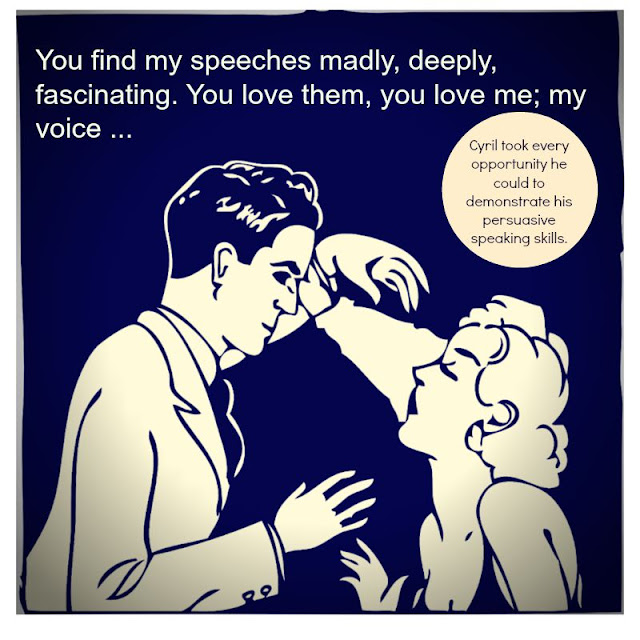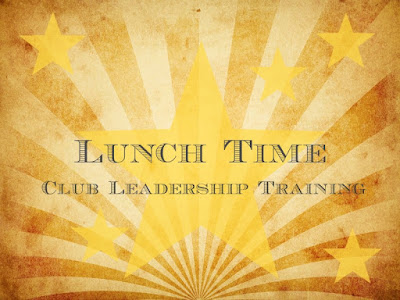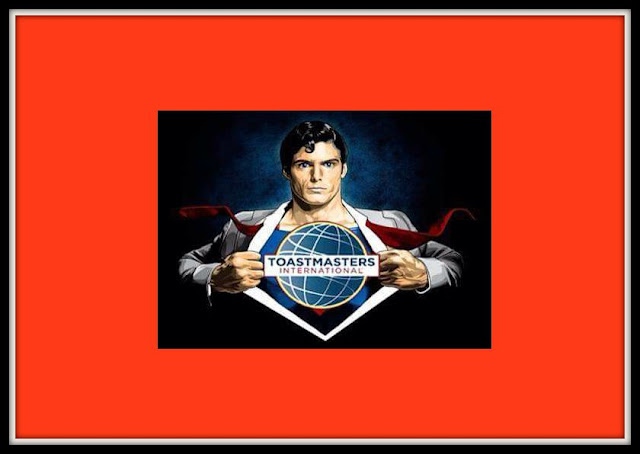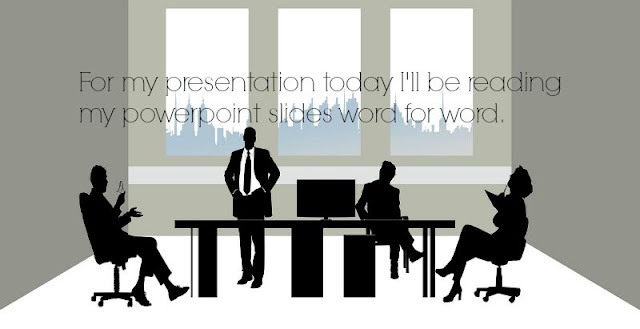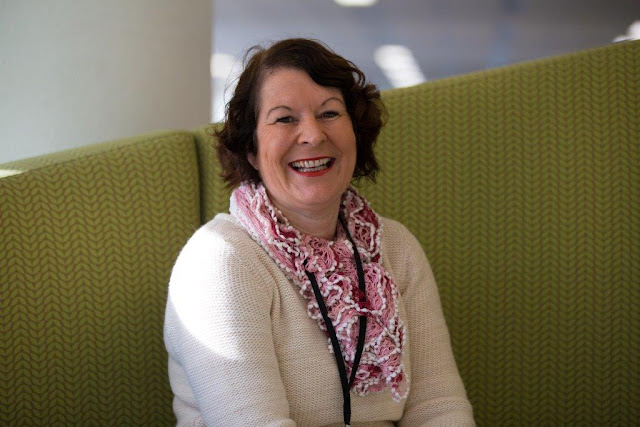The home of Toastmasters Division E Wellington, District 72 - a source of resources, inspiration, support and a calendar of events. Your input is welcome! *Eat Your Crusts = Do what you know is GOOD for you, rather than what is easy. Didn't your Mother tell you that?
Popular Posts
-
The whole truth, and nothing but the truth. Owen Winter, Area E6 Director, allowed his speech to be videoed at our last Club Leadership T...
-
The Division E Conference, featuring the Humorous and Table Topics Contests, was on Saturday 10th October at St Catherine's College, Kil...
-
Just before the Christmas break, Division E received an early Christmas present - a new Toastmasters club! A group of Wellington Toastmast...
Tuesday 25 August 2015
Tuesday 18 August 2015
Hypnotic public speaking
Saturday 15 August 2015
Lunchtime Club Leadership Training
Lunchtime Club Leadership Training was on offer for the first time this year. This initiative was the brainchild of Area E3 Director Sam Masters (High Noon Bankers, Willis Quarter, Taxing Toastmasters, BNZ Harbour Quays and Up Top clubs). Sam explains the thinking behind his push to make it available and shares what happened.
Why club committee members need training
The most important part of being on a club committee is being able to serve your club effectively and efficiently. The truth of the matter is we are all volunteers and the result of this is that if we can't be efficient with out time spent on Toastmasters often our clubs will suffer. This is not to say that we as leaders do sub par job, rather that the more efficient we are with our time the more we can do for our clubs. In the past I have heard people say I don't need Club Leadership Training (CLT) because if needed I can always find the right information somewhere. Although true to some extent, there is a major flaw in this logic. What happens when a members question needs to be answered or a club decision needs to be made and we don't have the time to look it up? To me, this is the issue that training helps to solve.
The quest for flexible training to fit member's needs
CLT is run to get committee members trained in how to effectively serve their clubs. When we joined Toastmasters choosing a club was driven by many factors. One factor that everyone of us would have considered would have been 'Does the meeting time suit my schedule?' We asked this question to ensure we could attend meetings and get the most out of toastmasters. At the start of my role as Area Director I realized that if Toastmasters choose their clubs based on times that suit them, surely we should be trying to train them in the same time slot. This idea was met with some serious skepticism as it was not the norm. With some persistence the idea gained momentum and we have successfully run the first ever split session lunchtime CLT with 18 officers trained.
The lunchtime format
To provide the same level of training the lunchtime CLTs were run as three, one hour sessions over consecutive Mondays with attendance required at all three to complete the training. This format allowed for all the same information to be delivered to trainees as in the traditional trainings but in a different time slot. Some Toastmasters are unavailable after work or on weekends due to family, extracurricular activity or geographical restrictions but they have spare time at lunchtime. These people are who this training was targeted at. There is no intention to replace all CLT sessions with lunchtime sessions rather to provide a range of sessions to choose the one which suits best. On the whole, these sessions achieved this purpose.
And the results were ...
I would like to say a big thank you to all those who help run the lunchtime sessions (Rob, Mike, Owen and Tim), to Gael and Larrie for believing this idea could possibly work and most importantly to all those who attended and made it a success. As a result of this successful experiment we will likely run lunchtime sessions again in February for the second round of CLT. I look forward to seeing even more of you there!
Location:
Wellington, New Zealand
Friday 14 August 2015
Wellington City Council Toastmasters Club - new and ready to welcome more members
Running the city of Wellington is a big job and requires lots of communication between staff working in many different areas. Fortunately, the new Wellington City Council Toastmasters club is here to help!
The club in formation has been meeting since April and now has 13 members. Meeting on Wednesday lunchtimes in the newly-refurbished Mezzanine meeting room in Wellington Central Library, the club is enjoying fun, varied meetings every fortnight.
At a
recent meeting, club President Terri Rosenstock won hearts by explaining
how to bake the perfect chocolate chip cookies - complete with samples
for the audience to try! VP Education Chris Ortiz followed up with a
hilarious speech about the hidden meaning behind the shape and contents
of a traditional pinata, illustrated with photos of a pinata Chris had
made herself.
"There's a very enthusiastic group," Terri said, "that's been here since the beginning. They're very committed."
Club sponsor Ian Lankow is very pleased with the new club's progress.
"The club managed [this meeting] all themselves with no help from me. They are a fully fledged club - they just need seven more members!"
Council staff interested in visiting the club can find information on the Council intranet, or by emailing toastmasters.wcc@gmail.com.
 |
| The Wellington City Council Toastmasters Club Committee |
The club in formation has been meeting since April and now has 13 members. Meeting on Wednesday lunchtimes in the newly-refurbished Mezzanine meeting room in Wellington Central Library, the club is enjoying fun, varied meetings every fortnight.
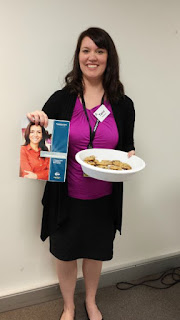 |
| Club President Terri Rosenstock |
"There's a very enthusiastic group," Terri said, "that's been here since the beginning. They're very committed."
Club sponsor Ian Lankow is very pleased with the new club's progress.
"The club managed [this meeting] all themselves with no help from me. They are a fully fledged club - they just need seven more members!"
Council staff interested in visiting the club can find information on the Council intranet, or by emailing toastmasters.wcc@gmail.com.
Labels:
Chris Ortiz,
Ian Lankow,
new clubs,
Terri Rosenstock,
Wellington City Council Toastmasters Club
Location:
Wellington, New Zealand
Wednesday 12 August 2015
Super toastie
The obligatory late comer tip-toed self-consciously to a vacant seat as the crowd hushed. Then there was silence, loud with expectation. It was Jarod's turn to speak. With one bound he was centre stage and fixing the audience with a mesmerizing glare, he wrenched opened his shirt, revealing the truth at last. He was Super Toastie! Three women in the front row swooned. A man let out a whoop ... *
*Palaver aside I want to know do they do these in "women"? Or is it one sex fits all? Just a thought. Fair's fair. Equal playing fields and all that.
Tuesday 11 August 2015
Tips for preparing a humorous speech
Are you funny ha-ha or funny ho-hum?
 |
| Rob Julian |
You can view his winning speech at the foot of the page.
The Toastmaster Humorous Speech Contest is almost upon us. Are you entering your club contest? If not, why not? It always seems to me that joining Toastmasters to gain confidence in public speaking, amongst other skills, and then not entering a club contest is similar to a person spending hours volleying a tennis ball against a concrete wall, and refusing to play a game of tennis.
One of the major reasons given is "I am not a humorous speaker. What if I try to give a humorous speech and no one laughs?"
Surprisingly, or perhaps not, the audience at a Humorous Speech contest is looking for things to laugh at. They will laugh at the weakest joke. It always surprises me how when I hit what I think is an hilarious comment, no one laughs and then when I make what I consider an ordinary mundane remark, the audience dissolves in laughter. Eh? What was funny about that?
To paraphrase a comment I recently read in The Toastmaster, have you ever heard a club member say ‘Boy, I am really looking forward to seeing (Bill, Janice, Mary, whomever) get up and make a fool of themselves at the Humorous Speech Contest?’ No? Well neither has anyone else.
Types of Humour
You will all be familiar with this list which is by no means exhaustive.
Bathos – (no, not ‘pathos’) – making a serious thoughtful comment and following it with a facetious observation. I intend to prepare my humorous speech a week in advance – yeah, right. (cf Tui Bill Boards)
Puns – said to be the lowest form a wit but everyone appreciates them. Giving a speech about chickens is a paltry eggsersize.
Epigrams – otherwise known as ‘one-liners ‘when I talk to myself, I at least have an intelligent audience’.
The Intellectual Twist – lead the audience into expecting a specific point and then giving something completely different. Book readers make novel lovers.
Topics for Humour
Over the years I must have heard hundreds of humorous speeches at Toastmasters. Invariably they relate personal experiences and observations. There have been topical speeches such as commenting on the book "Men are from Mars, women are from Venus", or "The Problem with Politicians", but I personally find these difficult. Topics I can remember mostly revolve around themes such as
- Adolescence – the pain of growing up
- Romance and courting – the agony of the first date
- Parenting – coping with teenagers, children, grandchildren
- Holiday disasters – arriving in London with your luggage in NewYork
- Keeping up with fashion – gym gear, social mores, wearing high heels, etc.
- Coping with life – the Doctor/Dentist, Bureaucracy, flatting, marriage.
- Living with a cat (or whatever)
Use your past embarrassing moments for inspiration
You will notice that these are all topics above involve you telling of experiences that were hugely embarrassing at the time.
- Your child throwing a super tantrum in the supermarket.
- Forgetting the name of your boss when introducing him/her.
- Finding your 18 year old daughter’s boyfriend in bed with her on a Sunday morning. (Like what on earth do you say?).
Everyone can relate to these instances because they have all faced similar ones themselves.
In my speech at the District Final in Tauranga I related how I got distracted by my grandson Jack when helping him into his togs at the swimming pool. And then when I was relaxing in the toddlers’ pool watching him suddenly realised I had forgotten to change into my togs and was still in my underpants. People roared with laughter. But at the time it was definitely NOT funny.
So – pick a theme from above, like Life with my Husband. Think of three things he has done to embarrass you horribly. Describe each on and after each description, make a comment. After the third, draw a conclusion, with a message for the audience. Despite all this I do love him dearly. How do you get on with your significant other? Remember, it has got to be a proper speech with a beginning, a body and a conclusion.
Things to avoid
- Sarcasm
- Belittling other people
- Potty humour – poohs and wees. You might reduce 4 year olds to helpless laughter but not a Toastmaster audience.
- Blue humour – that is dirty jokes. This is not to say risqué humour should be avoided but be careful. You may get 60% of the audience laughing, but if you get 40% of the judges offended you won’t get placed.
- Ethnic, racist, or sexist jokes – unless you can turn it against yourself. Jewish people can make Jewish jokes but not anyone else. Insofar as my mother came from Scotland, I can just get away with a Scottish joke. But as they say What is brown, red and lies bleeding in the gutter? A brunette that has made one blonde joke too many.
What do you do about laughter?
Like what if you don’t get any? Just pause. Often it is because the audience don’t at first get it. Then, either carry on as if nothing is untoward – or, one of my favourite techniques if to hold my hand as if I am making a cell phone call and say ‘Beam me up Scotty, there’s no one down here’. Which signals to the audience that I have just made a joke and I expect laughter. It falls flat if no one can remember ‘Star Trek’ on TV.
When you do get laughter, allow it to happen. Don’t cut it off. In a larger audience, you often get two waves of laughter. The first when they know you have made a joke, and then a further wave as they fully appreciate it. If you get up to the District finals, be aware that there will be Aucklanders in the audience. And they always laugh three times at a joke. The first time when they hear it, the second time when it is explained to them, and the third time the next day when they finally get it. You can substitute ‘Australians’ for ‘Aucklanders’ where appropriate.
So go to it. Prepare a speech that is no longer than 7 minutes. Preferably 6 ¾. You will find that laughter takes up time and you don’t want to give the funniest speech and then be disqualified by going over time.
When you do get laughter, allow it to happen. Don’t cut it off. In a larger audience, you often get two waves of laughter. The first when they know you have made a joke, and then a further wave as they fully appreciate it. If you get up to the District finals, be aware that there will be Aucklanders in the audience. And they always laugh three times at a joke. The first time when they hear it, the second time when it is explained to them, and the third time the next day when they finally get it. You can substitute ‘Australians’ for ‘Aucklanders’ where appropriate.
So go to it. Prepare a speech that is no longer than 7 minutes. Preferably 6 ¾. You will find that laughter takes up time and you don’t want to give the funniest speech and then be disqualified by going over time.
Rob's winning speech
Speech: Rob Julian Toastmasters Humorous Speech District Convention 2011 from Toastmasters New Zealand on Vimeo.
Labels:
bathos,
Capital Toastmasters Wellington,
embarrassment,
epigrams,
ethnic,
humorous speech contest,
humorous speech topics,
humour,
puns,
racist,
Rob Julian,
sexist,
types of humor,
using sarcasm
Join us for the World Champion Public Speaking final
30,000 became 100. 100 became 10. And 10 became 1 - the winner!
At the beginning of the year approximately 30,000 contestants from 126 countries started on the journey to see which of them would become the 2015 World Champion of Public Speaking.
Now those 30,000 hopefuls have been whittled down to 100. That's 10 semi-finals - 10 speakers in each. The winners go onto the final.
Will our contestant Matt Colcombe be one of the chosen 10 to take part? *
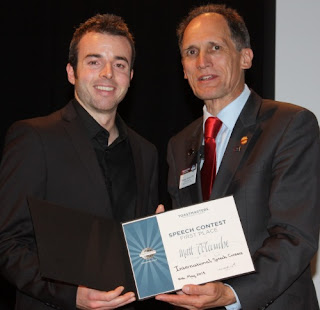 |
| Matt Colcombe accepting his 1st place certificate from past District Governor Kingsley Moody. |
The semi-finals are to be held on the 13th of August and the final on the 15th of August in Las Vegas, USA.
*Update -The results of the semi-finals are in. Matt was not placed. Eye-witness Stephen Preston reports; "Matt absolutely did our country proud in an amazing semi-final field today."
You are (virtually) invited to the final
You may not be physically present but you can be there in spirit!
(Being ahead of the USA time zone, the event will happen in the wee small hours of Sunday morning our time - hence the delay.)
For just $10 you will get to enjoy the social vibe and network with other Toastmasters, refreshments provided, while watching the event and seeing the best speakers in the world battle it out for the title of Toastmaster International 2015 World Champion of Public Speaking. NZ has won this twice before and we have our fingers crossed that Matt can bring home the title again.
For full event details please visit: Watch the World Championship of Public Speaking
For full event details please visit: Watch the World Championship of Public Speaking
Download a pdf of the invitation to the BNZ Harbour Quay virtual final and share it! Get a group together ...
More information:
Our previous wins and placements at the World Championship of Public Speaking:
Labels:
BNZ Harbour Quays Toastmaster Club,
David Nottage,
District 72,
Kingi Biddle,
Kinsley Moody,
Matt Colcombe,
New Zealand,
Toastmasters International World Champion Public Speaking Contest 2015
Sunday 9 August 2015
We are distinguished!
Getting your club to President's
Distinguished is a lot of hard work, and it can take a real team
effort with the whole club contributing. Well, imagine getting an
entire Area, Division or even District to Distinguished status!
Congratulations
In the 2014-15 Toastmasters year,
District 72 (New Zealand) was a Distinguished District – a big
achievement that required 8 new clubs to start, as well as membership
growth of around 160 members throughout the country, and at least 40%
of our clubs to be Distinguished. Congratulations to the District
team on this success!
Congratulations Division E
As well as that, Division E was
President's Distinguished, meaning that at least one new club started
and more than 70% of the clubs in E achieved Distinguished status.
And five of the Areas were Distinguished or higher, too!
Congratulations to the immediate past Division E team!
- Ian Lankow – Division E Governor – President's Distinguished
- Larrie Talbot – Area E1 Governor – Select Distinguished
- Sanjiv Jetly – Area E2 Governor – Select Distinguished
- Billie Searle – Area E3 Governor
- Lillian Morrison – Area E6 Governor
- EJ Willmot – Area E7 Governor – Select Distinguished
- Rob Barton-Howes – Area E9 Governor – Distinguished
- Terry Cave – Area E10 Governor – President's Distinguished
Labels:
Billie Searle,
District 72,
Division E,
EJ Wilmot,
Ian Lankow,
Larrie Talbot,
Lillian Morrison,
Presidents Distinguished,
Rob Barton-Howes,
Sanjiv Jetly,
Terry Cave,
Wellington Toastmaster clubs
Tuesday 4 August 2015
Owen Winter presents ...
The whole truth, and nothing but the truth.
Owen Winter, Area E6 Director, allowed his speech to be videoed at our last Club Leadership Training Session. It can be a very confronting thing to do as seeing yourself as others see you can be quite a shock.
Is that really me? Do I sound like that? Do I actually move like that?
Despite the surprises, it's a great learning experience, as Owen found out.
Owen Winter, Area E6 Director, allowed his speech to be videoed at our last Club Leadership Training Session. It can be a very confronting thing to do as seeing yourself as others see you can be quite a shock.
Is that really me? Do I sound like that? Do I actually move like that?
Despite the surprises, it's a great learning experience, as Owen found out.
The bigger picture of Toastmasters
Owen on the experience of seeing himself ...
"When
the suggestion was made during the Club Leadership Training session on
Monday night that we could video my presentation on the bigger picture
of Toastmasters I was very gungho.
In all my years as a Toastmaster I
had never actually seen myself present - although as a speech contestant
I had been told it would be valuable.
As I was uploading the video and reviewing it I was reminded how surreal and confronting it can be to see yourself on video - but more than anything it was hugely useful! Watching myself present I was able to see aspects that people had commented on - both the recommendations and commendations received for both this presentation and others.
As I was uploading the video and reviewing it I was reminded how surreal and confronting it can be to see yourself on video - but more than anything it was hugely useful! Watching myself present I was able to see aspects that people had commented on - both the recommendations and commendations received for both this presentation and others.
With
Toastmaster clubs across the division preparing for contest season I
would highly recommend that anyone is serious about entering the
Humorous Speech or Table Topics contests at any level to video yourself
and watch for the traps you have been told about whether it's body
language, vocal variety or the use of the stage. You may think you are
aware of how your speech is going, but when you are able to see it play
live in front of you suddenly you see a whole new view!"
Have you videoed yourself? What have you thought about seeing yourself?
Your comments are welcome!Saturday 1 August 2015
Carol Mitchell - District Director
"I remember how nervous I was about stepping up as a leader at events like Club Leadership Training. That “imposter within” was convinced I would last two seconds on stage before being booed off."
When you look back and see the woman who first joined Toastmasters and the one you are now - what differences do you see?
I joined Toastmasters eight years ago.
Then, while I appeared outwardly confident, the inner reality was
another story. I battled imposter syndrome. Part of me kept waiting
to be told to stop pretending and go home! I realise now it was a
fairly typical case of “low self-esteem” in that I was relying on
other people to affirm that I was capable rather than believing it
for myself. I see that I've been on a journey. At its heart there's
been a transformation of my core beliefs about who I am and my
abilities.
The expression of those changes has
rippled through every facet of my life: private and public. I have
grown and deepened. My leadership and public speaking skills have
developed immeasurably which in turn positively influences my
professional life. That's something I'm very grateful for.
I remember how nervous I was about stepping up as a leader at events like Club Leadership Training. That “imposter within” was convinced I would last two seconds on stage before being booed off. It didn't happen. Instead people were tolerant and kind. They gave me space to learn, to try, and to succeed.
I remember how nervous I was about stepping up as a leader at events like Club Leadership Training. That “imposter within” was convinced I would last two seconds on stage before being booed off. It didn't happen. Instead people were tolerant and kind. They gave me space to learn, to try, and to succeed.
Another key lesson I've learned is the
ability to “read” an audience. It's taken a while. At first I was
consumed with quelling my anxiety, staying on stage, getting my part
right, and over. Now that I've moved from survival mode I'm able to
focus my energy on what the audience wants and have the ability to
adapt my presentations to meet their needs. I am more “in the
moment”.
The biggest realisation is that very
few of us are born great speakers. Public speaking is a collection of
skills. With practice we can acquire and refine them.
What
are the most important lessons you've learned over your Toastmaster years?
The
good, the bad, and the ugly?
On the good
The good is easy to comment on! I have received so many benefits. I've been given self-development opportunities, met extraordinary and inspiring people, and made life-long friendships.On the benefit of getting "kicked in the pants"
One of the best gifts is being on the receiving end of repeated “kicks in the pants”! It sounds painful but it's not. What I've finally accepted is that criticism and suggestions for improvement don't have to be met with an automatic defensive response. People are actually caring about me, and thinking through what I need in order to move up a level. Those “kicks in the pants” are valuable. I've learned to accept them in the spirit with which they're given.On the lessons of diversity
The tough stuff is just that: tough. It would be the same anywhere, in any organisation. Toastmasters is made up of people and people behave in all sorts of ways. Some of those ways are difficult. Opinions can be harsh. Organisational skills can be woeful. Often there is baggage to sort through. Is this mine, theirs or ours? It's a bit like being in a family. We have to be prepared to acknowledge, and accept differences and find a respectful way of dealing with them. Growing up is a journey that doesn't stop!When have you felt most proud of your TM achievements? What were they, and why?
The first is when I received my Competent Communicators award. I remember thinking, “I'm competent!” and I got a badge which I very proudly wore. It was such a good affirmation.
The next is setting up Cupcake
Communicators – a women only club. It was a risk! A club full of
ladies has the potential to become dangerous – a full on cat fight.
But thankfully it isn't. We bring the best of ourselves to meetings.
It's creative, supportive – a fabulously nurturing environment. I
love it.
And lastly, delivering an Educational
at the home club of Toastmasters
International President Mohammed Murad while he
was in attendance.
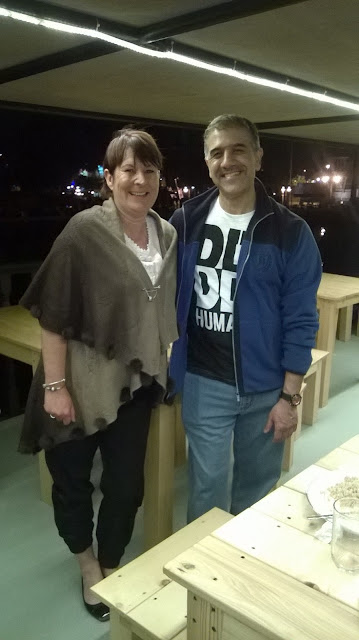 |
| Carol with Mohammed Murad, Dubai 2015 |
I was in Dubai in January 2015 and a
friend asked me to give a talk on effective evaluations at a new
club. It was received very well. Word of it got around and I was
requested to give it again. This time it was at Mohammed's club,
Toastmasters Dubai Chapter. I was so nervous about being in front of
the big boys that I thought I might “pee my pants”. I didn't, and
later basked in a warm fuzzy glow of pleasure and pride.
Where do you want to be over the next 2 - 3 Toastmaster years? Why?
My focus over the next year is not me
but the District. I aim to make sure it gets what it needs to
continue to develop. All my energy will go into supporting and
pushing for that to happen.
Once the year is done I hope to have
the passion and enthusiasm to be a “good” member of a club. It's
not a question of having completed Toastmasters. That will never
happen. Toastmasters is a process. It's a refinement or evolution of
skills. I am looking forward to being Carol the member again, and to
getting back into contests. I've an International speech already
written and waiting.
If I was to begin my Toastmaster journey again I would ...?
This is easy! I would take more notice of people with expertise and experience a whole lot earlier!
For instance - Joy Ackrill. She gave,
and continues to give, superb educationals. Once I really started
listening I realised what she was offering to help me grow.
I would also be more aware of the
structure of the club itself and be a more reliable member. I thought
it was “a bit of a hoot” and didn't take it particularly
seriously. I loved the fun parts – a bit like a kid going to school
to eat lunch and hang out. The “tea and bikky” half time routine
was a favourite.
With hindsight, (always beneficial), I
see I was slow to grasp the potential, to see what was possible, and
on offer. There was a wealth of experience to tap into. These days
I'm grateful, and Joy is my mentor.
Which public speakers or leaders (not necessarily inside Toastmasters) do you admire and why?
Outside Toastmasters
The top of my list is Mother Theresa. When I finally grow up, if I have just a smidgen of her gift as a speaker to give I'll be happy.
I admire the current Pope.
He walks his talk.
Inside Toastmasters
And there are Toastmaster people – Joy Ackrill for her honesty (lack of sugar coating), generosity and knowledge, Chrissy Meyer, Laurel Francis, Sarah Bate for friendship, support and, everything … It's a very long list!
Toni Sharp gets a special place because
she is my reality check. When a dose of the “can't do its”
threatens to swamp me I think of her. She is the ultimate example of
having what it takes to “keep on, keeping on”. (Toni
is totally blind but has never let that curtail
her life. She was awarded a Queen's Service Medal in 2014 for her
services to the blind community.)
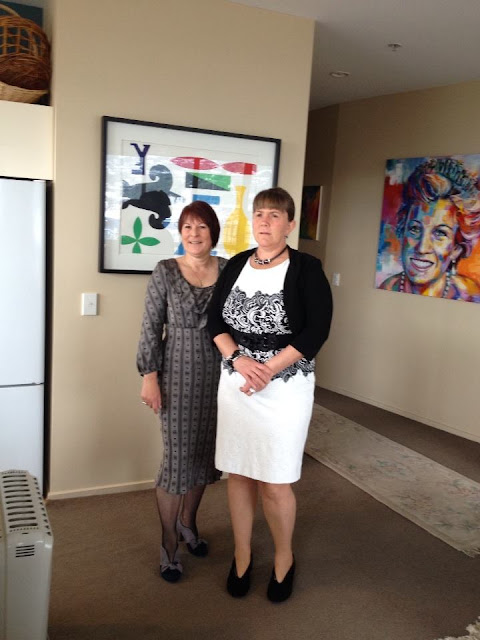 |
| Toni Sharp (with Carol) at her 2014 Queen's Service Award presentation |
Resources? Books? People? Websites? Any to recommend?
I use the Toastmaster
International website all the time but beyond
that I haven't got books or sites to recommend. I'm not a collector
of self-help materials. I tend to go looking for specific things when
I need them.
On getting yourself a mentor
What I do wholeheartedly advocate is getting yourself a mentor.
This is a person who will be your
sounding board. They'll help you identify and set goals and work out
a tailored programme to meet them while keeping you grounded, and
focussed. What they won't do is write your speeches for you!
Many clubs run a mentoring system –
some to get people through their first three speeches and some going
beyond that. I'd personally like to see it sustained. If it's done
well mentoring is akin to coaching. That person is aware of your life
goals and will bring to your awareness opportunities to move ahead.
They reveal possibilities – see things in you that you can't see
for yourself. And best of all, they short circuit any tendency to
wallow in negativity.
Of course the person you choose doesn't
have to come from within your club and neither does one mentor have
to fit all situations. You could have a mentor for speeches, one for
leadership challenges and so on.
Get one today!
And is there
anything else you feel like flinging in - on balancing careers ...
On work-life balance and doing everything
One of the major areas I've had to look
at is organisational skills. Toastmasters deserves the best of what I
have to offer. To achieve that I need to be fully organised. My work
deserves the best of what I have to offer. To achieve that, I need to
be fully organised. I also need a life beyond both of them. To
achieve that I required a system to keep all three spheres in
balance.
I use a work-life-balance sheet* which I
faithfully fill out, review and adjust. It lets me see what is going
on in my life – as opposed to what I think or feel is going on.
Although the Toastmaster commitment
increases as you go up the role levels, we can do all the things we
want to, if we plan and do them consciously. That also entails
keeping an eagle-eyed watch out for procrastination. Dismissing
things as too hard, too time consuming or simply slopping them into
the “don't feel like it – not now” bucket doesn't cut it.
If you decide to take it, stepping up
in to leadership is a fabulous ride! In good Toastmaster fashion I
recommend it.
Thanks Carol.
Labels:
Carol Mitchell,
Competent Communicator,
District 72,
District Director,
imposter syndrome,
leadership,
mentoring,
Mohammed Murad,
Toastmasters New Zealand,
Toni Sharp,
work-life balance
Location:
Wellington, New Zealand
Subscribe to:
Posts (Atom)



